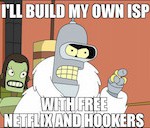Last week’s article on Net Neutrality focused primarily on what not to do. Net Neutrality shares an ideological pedigree with every other government backed “solution” intended to solve the problem fostered by government itself. The solution to the (mostly) unfounded fears of Net Neutrality advocates is more competition, not more government one-size-fits-all programs. The only way to get more competition is to reign in government’s ability to restrict it.
The overriding problem is structural. The world we live in is the result of decades of misguided policies and government induced market distortions. Like some perverse game of pick up sticks, this state backed structure retains its form no matter how many pieces are removed, impervious to all “reform.” The state has wrought a Gordian knot so intractable the only solution is to cut it.
At the ground floor of this structure are local municipalities that grant utility providers exclusive monopoly privileges in exchange for the fig leaf of “oversight”. If an outside Internet Service Provider (ISP) wishes to enter that market they have no choice but to negotiate either with the municipality itself or its pet public utility for access to “public” infrastructure such as utility poles or underground conduit. The fees charged for such access can double the cost of the entire project, turning an economically viable endeavor into one that is hopelessly unprofitable and results in the ISP throwing up their hands in disgust and walking away. This encourages either no service or monopoly service. Just as a sperm cell induces a protective response in the egg it fertilizes, so too does the first ISP in a region use the powers of its municipal host to keep out all would be competitors. For example, they may negotiate a contract that requires the municipality or public utility charge any future competitors much higher rates for access or a guarantee of exclusive access, thus effectively securing their monopoly position. In at least 20 states so far some ISPs have pushed for legislation that blocks municipalities from competing as ISPs themselves. Such legislation is typically cloaked in the rhetoric of “saving jobs” to pass the sniff test of public opinion. Not that “municipalizing” an industry is ever a good idea, but to the extent that it is possible for this to occur without the use of any taxes, subsidies or eminent domain, there is theoretically no ethical issue with such competition. Although I would seriously question whether such tax-free competition is possible, the easiest way to test that is to remove the power of taxation and eminent domain, not create a rat’s nest of exceptions and restrictions.
To ultimately solve these issues we need fewer, not more laws. We need fewer grants of monopoly privilege for both private and “public” interests. Municipalities should have no rights to grant charters or licenses to any business. This removes the whole notion of “public” utilities. With that antiquated framework swept away, we would witness competition between electric, gas, water, sewage, phone, and Internet providers solve an array of problems that are intractable under the current “public” system. For example, restrictions in Georgia on the generation of solar power, water rationing during drought, and poor and expensive phone service, are all easily solved in a competitive environment. For Internet access one solution could be totally free access but the consumer pays the content provider directly. Or a consumer pays their ISP but there exists an explicit contract where the ISP guarantees maximum speed to all content. Or a million other approaches that neither you nor I can predict. We must dispense with the “should” attitude of “it should work this way or that way.” “Should” implies the necessity of an enforcer to make that “should” a reality. “Could” is more appropriate. It acknowledges the uncertainty of anyone being prescient enough to know what is best. To paraphrase Yoda, “No should! Could or could not, there is no should.”
Competition permits the creative power of millions to come to bear on solving problems. They pursue it in hopes of “winning” the best-solution-lottery that will yield happy paying customers. Municipal monopolies maintain a legacy status quo system by restricting all allowed approaches to just one. If one is knowingly ingesting poison the solution is to not also simultaneously ingest an antidote; the solution is to stop ingesting the poison.



